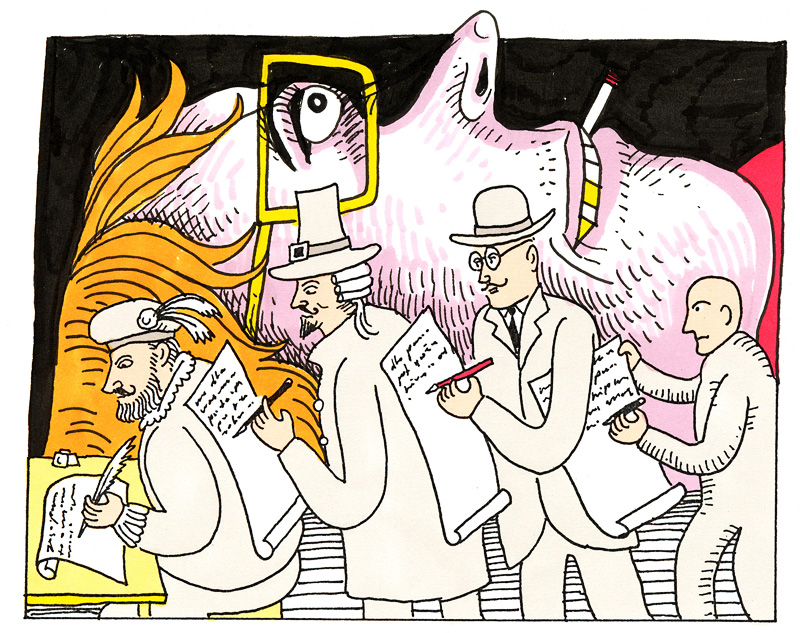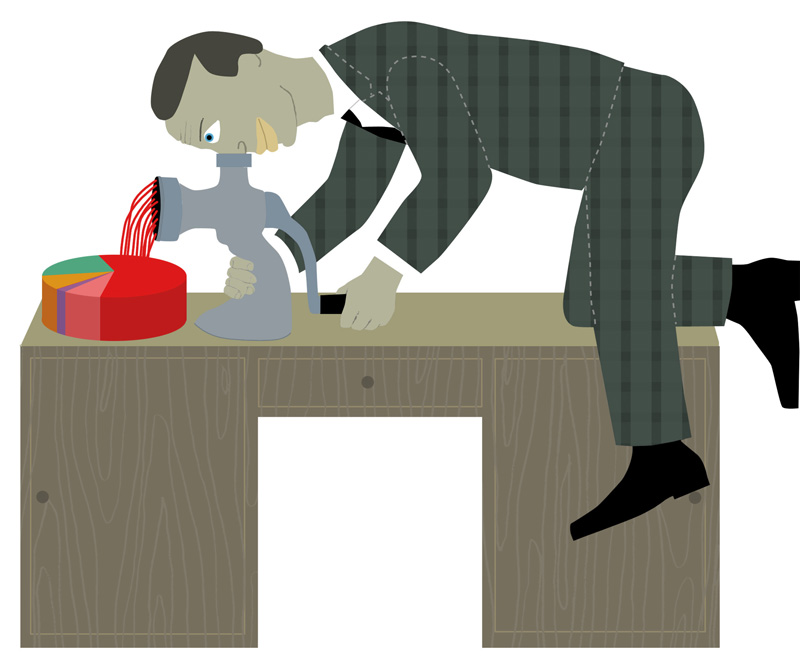Twenty-five years of non-stop economic growth, a big market, and fast-improving infrastructure have resulted in a real boom in foreign private capital investment and helped Poland thrive. However, needless to say, it takes more than macroeconomic indicators to enter into a successful partnership with a foreign business. In Poland, establishing a good relationship is crucial and in order to go through the process smoothly, you might want to learn about a few Polish business habits.
Finding business partners
 Illustration by Bartosz Mucha/Forum
Illustration by Bartosz Mucha/ForumPoles rarely do business with people they don’t know personally. This is why you would usually need to organise a face-to-face meeting even if all the details could be set via email or phone. There is a strong need for a certain level of trust and reliance between business partners in Poland and this is hardly ever achieved via Internet or phone. If you propose a new joint venture, you will most probably be invited to come to Poland. The more casual and friendly this first meeting becomes, the better for you!
Poles tend to rely on word-of-mouth recommendation, so if you know any Poles personally, don’t be afraid to ask if they know some people in your line of work. If you don’t know anyone, start small but do an outstanding job. You can be certain that word will spread.
If you want to cooperate with a large firm don’t be discouraged if you first have to meet lower-ranking employees. Big Polish companies have the same structures as western corporations, so it may take a while until you get to the person able to sign the deal you want.
Meet & greet
 Illustration by Tomasz Wawer/Forum
Illustration by Tomasz Wawer/ForumArrive on time. Should you manage to arrange a meeting with the people you wanted, plan in advance to make sure you don’t encounter unexpected delays. You may come across the odd slow Pole, but the general rule is to be dead on time so as not to annoy time-sensitive people… and there are quite a few of them!
A firm handshake with a courteous smile is standard for both men and women. Unlike at a more casual meeting, business manners are always the same. Just watch out for ladies, as they may either give you a handshake or just politely nod at you. Kissing women’s hands used to be quite popular a few decades ago but now has gone completely out of fashion and tends to be mocked so don’t try it. Don’t try to kiss anybody else either. Man-to-man kisses (still very popular in some parts of Eastern Europe) are hardly seen in Poland (they remind Poles of some Soviet traditions) and could be very embarrassing for your business partners. Hence golden rule no. 1 – no kisses!
Use the proper forms of address. At the very beginning of the meeting the person hosting you will surely introduce you to his or her colleagues. Even though she/he might not use titles, remember to never address people by their first names unless you are invited to. In formal relationships Poles stick to honorific titles, i.e. they use their last name with ‘Pan’ (Polish for Mr.) or ‘Pani’ (Mrs.) before (Pan Kowalski, Pani Kowalska). The tricky part is that some people demand to be called by their professional or academic titles. The borders of whether they do or don’t are blurry but it’s better to use them when addressing academic professors, PhDs, other people occupying important posts in education, most officials (especially diplomats), doctors and clergyman.
Gifts are welcome but don’t go overboard. Giving a gift is a purely symbolic act. Poland has long struggled with corruption, a typical inheritance from the communist period, so giving something very valuable might be regarded as ambiguous.
Getting to know your business partners
 Illustration by Tomasz Wawer/Forum
Illustration by Tomasz Wawer/ForumGolden rule no. 2 – never underestimate the significance of small talk. After you've said your ‘dzień dobry’ (Polish for ‘good day’) and been introduced to everybody in the room comes the time to get acquainted. Remember that one of the most crucial purposes of the meeting is to weave the foundations of your relationship with your future business partner so let the small talk last as long as your partner wants. Be careful though, it is likely to imperceptibly move to more specific matters.
Don’t boast. Poles look for honesty, reliability, personal integrity, and experience. Showing great self-esteem or self-confidence might not be the best idea. Poles don’t like to praise themselves; boastfulness is regarded as a vice and when asked directly about their success story they are likely to reply with great modesty, almost understating their achievements. They believe that if you’re good enough you don’t have to tell everybody about it. Your actions should speak for themselves.
Preparing a few nice sentences about Poland as well as learning a phrase or two in Polish is a good icebreaker. What can be surprising is that you might be asked some questions about your family as well. It is not because Poles are extremely nosy but because family life is very important to most Poles and talking about one's spouse, kids or last year’s family holiday is regarded as absolutely normal. According to a recent poll, family life is by far the most important value for Poles with good health, honesty, a successful career and peace coming afterwards.
Golden rule no. 3 – don’t even try to bring up politics, religion or social issues – that will likely put you in a great danger of getting to the point of no return.
Getting down to business
 Illustration by Tomasz Niewiadomski/Forum
Illustration by Tomasz Niewiadomski/ForumWhether it is done more officially or not, on the first or subsequent meetings, the small talk will eventually transform into serious business talk.
Poles are believed to be honest, straightforward communicators. However, you may encounter a dose of diplomacy and some beating around the bush depending on whether you already know each other or not.
Don’t fool around. Business is done with great attention but also with a certain reserve. There is usually little space for superficial smiles or jokes. Unlike in the southern parts of Europe, where a friendly and enthusiastic atmosphere can be obtained relatively easily, it generally takes quite a lot of time and effort to move on from a formal to a more casual style of communication.
Never come without hard data. To convince your Polish partners of your reliability and your offer's profitability you should absolutely back it up with numbers, research or a well-justified prognosis. Poles love facts; their decisions are rarely purely emotional (even if their first reactions may be).
Poles tend to be risk-averse, so try to present your deal as a safe choice. Mildly emphasise the risks of not opting to do business with you, rather than on distant hypothetical gains.
Don’t be too aggressive. Polish businessmen are soft to medium-hard negotiators. They are not very keen on taking huge risks, pushing the deal to its limits or playing ‘take it or leave it’ tricks on you. The philosophy behind this is that once they have taken their time to size you up and got down to negotiating, they believe that both sides want the deal to be finalised, and it is just a matter of time and discussion to find the point where it’s satisfactory for everyone involved. It can go even further when the actual people you are doing business with are not precisely businessmen (artists, social activists, employees of cultural institutions, etc). The old British saying ‘Gentlemen don’t talk about money’ is very popular in Poland and it might make directly talking about money and negotiating a little tricky. Stand your ground, but be patient and don’t threaten to walk out on the deal.
Summarize meetings in written form and send it to your partners. They might beat you to it, but either way, everything you agree on during the negotiation process should be written down and presented to both sides in this form before you go any further. Oral-only agreements are uncommon and hardly ever serve as a substitution for written ones.
It almost always takes more than one meeting to have the contract signed and sealed. Even if all the details have been set, another meeting would be scheduled for the actual signing. The aim of it is to provide both sides with some time for consideration and to prepare documents. Rushing this process will likely make your partner hesitant or even suspicious.
Farewell
 Illustration by Bartosz Mucha/Forum
Illustration by Bartosz Mucha/ForumYou can easily judge how successful you were by observing your partners' behaviour as you say goodbye. The more relaxed they are and the more eye contact you have with them, the better for you. The ending of the first meeting is also the moment when people exchange business cards in Poland so don’t forget to bring yours.
Good luck!